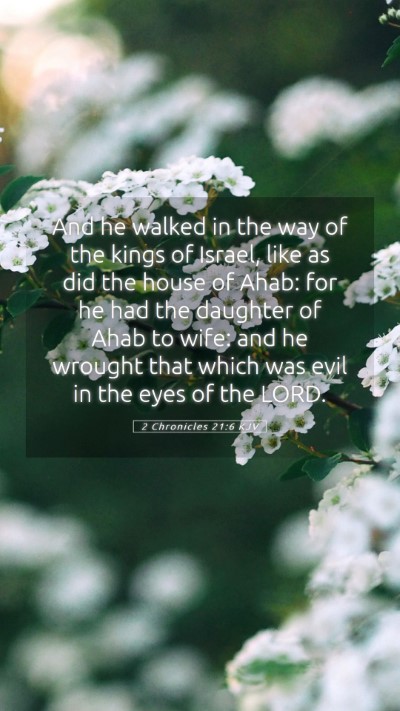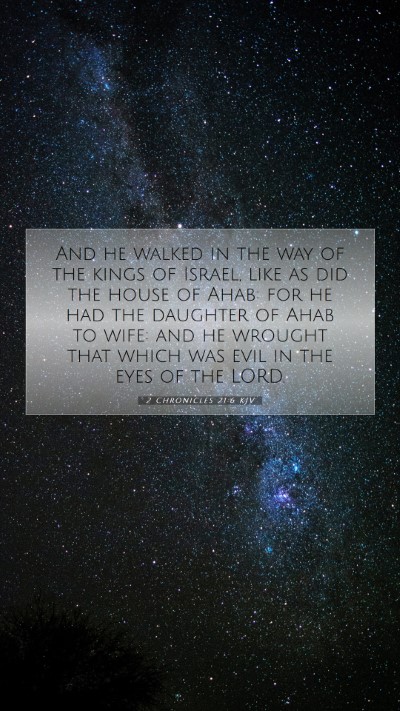Understanding 2 Chronicles 21:6
The verse 2 Chronicles 21:6 states, "And he walked in the way of the kings of Israel, like as did the house of Ahab: for he had the daughter of Ahab to wife: and he did evil in the sight of the LORD." This passage presents significant commentary relating to King Jehoram's reign in Judah and highlights the consequences of aligning with ungodly practices.
Overview of the Verse
In this context, Jehoram's actions symbolized a profound departure from the righteous path laid out by his forefathers. His marriage to the daughter of Ahab—a king notorious for idolatry and wickedness—signaled a dangerous alliance that profoundly influenced his decisions and led Judah into a period of moral decline.
Insights from Commentaries
Matthew Henry's Commentary
Matthew Henry emphasizes the grave implications of Jehoram's choices.
- Influence of Idolatry: The alliance through marriage directly connects Jehoram with the corrupt practices of Ahab's lineage.
- Walking in Evil: The phrase "did evil in the sight of the LORD" encapsulates the essence of his rule; it denotes a conscious choice to go against God's commandments.
Albert Barnes' Notes on the Bible
Albert Barnes provides further analysis on King Jehoram’s actions.
- Comparative Analysis: He points out Jehoram's alignment with Ahab's house as not merely political but spiritual, illustrating the dangers of ungodly alliances.
- The Consequences of His Actions: Barnes highlights the repercussions of Jehoram’s reign, asserting that his decisions led to death, disaster, and divine judgment upon Judah.
Adam Clarke's Commentary
Adam Clarke delves into the specific ramifications of Jehoram marrying Ahab’s daughter.
- Pagan Influence: Clarke notes the introduction of Baal worship into Judah and how it morphed the worship practices of the people.
- Judgment from God: Clarke identifies that the heart of Jehoram's sin was a departure from covenantal faithfulness, which eventually culminated in severe punishment from God.
Application and Interpretation
Understanding this verse allows for deeper biblical exegesis and insight into the nature of leadership and faithfulness to God. The following points offer a modern-day application:
- Moral Integrity: Jehoram’s life serves as a warning against compromising one's beliefs for personal gain or alliances.
- Spiritual Vigilance: The significance of maintaining a close relationship with God amidst external influences cannot be overstated.
- Consequences of Sin: Recognizing the essence of sin not just in actions but in the covenant relationship with God helps believers understand Scripture more profoundly.
Cross-References
- 1 Kings 16:30-33: Ahab’s wickedness and its long-term effects.
- 2 Chronicles 22:2-4: The implications of Jehoram's reign and the influence of his mother.
- 2 Chronicles 24:17-19: Subsequent generations also suffer due to inherited practices of sin.
Conclusion
This detailed examination of 2 Chronicles 21:6 uncovers the layered meaning of the verse and provides a foundation for Bible study insights. It illustrates the importance of understanding Scripture within its historical context and its application to modern life.
For those engaged in Bible study groups or seeking online Bible study resources, this analysis offers a comprehensive tool for examining difficult passages and finding deeper meanings in the Word of God.


